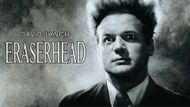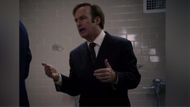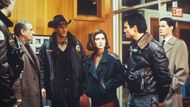The films and tv series of American filmmaker David Lynch feature characters that usually reflect the depth, darkness, and complexity of the human mind. These characters not only advance the story, but also connect with the audience's mental and emotional states. Below are ten characters that highlight different aspects of the human mind.
10 David Lynch characters that paint a picture of the human psyche
Henry Spencer – Eraserhead (1977)

Where to watch: Amazon Prime Video and Apple TV.
Henry Spencer, the protagonist of David Lynch's first feature film, Eraserhead in 1977, is a remarkably symbolic character. Here, Henry Spencer transports the audience into a restless, nightmarish, and deeply personal psychological world.
Jack Nance's gentle yet brooding performance portrays Henry as a man who is at once ordinary and at the same time utterly alien and troubled. His expression is always questioning, as if he is wondering about the world, afraid, and trying to figure out where he stands.
Laura Palmer – Twin Peaks (1990)

Where to watch: Amazon Prime Video, Paramount+, Apple TV
Laura Palmer was outwardly the ideal girl, the best student in school, beautiful, social, loved by her friends, and accepted by society. But as the investigation progresses after her death, viewers learn that beneath this ideal facade lies deep emotional pain, drug addiction, secret relationships, and a terrible family truth. Laura's life was a reflection of duality, an ideal in the eyes of society. On the other hand, immersed in a dark world where she is alone, helpless, and a victim.
Dale Cooper – Twin Peaks (1990)

Where to watch: Amazon Prime Video, Hulu, and Paramount+.
Dale Cooper creates a remarkable blend of logic and science in his investigation. He pursues logic and science with precision, but his level of imagination and emotion is also profound. Cooper often expresses his admiration and fascination for the beautiful mountains, forests, and spiritual life and unity of Twin Peaks' inhabitants.
Frank Booth – Blue Velvet (1986)

Where to watch: Amazon Prime Video
Frank Booth's character has an unusual psychological and physical response that creates a disturbing experience for the audience. While Frank's presence is thrilling and exciting, his behavior and attitude lead to a kind of infinite loss. The details of his character emerge very slowly throughout the film, and his rough and unstable nature scares and surprises the audience.
Betty Elms / Diane Selwyn – Mulholland Drive (2001)

Where to watch: Amazon Prime Video, YouTube Movies, and Google Play Movies.
Here, Betty Elms' character is initially bright, optimistic, and innocent, completely spiritual and holy—she seems to dream of success in her own life. Through Betty's character, Lynch goes beyond the simple boundaries of human psychology, where reality and fantasy merge. At the beginning of the film, Elms finds a woman who has been injured in a car accident and has lost her memory. Questions about the identity of this injured woman and her life begin to arise. Here, the story takes a turn.
The Mystery Man – Lost Highway (1997)

Where to watch: Amazon Prime Video and YouTube Movies
In the film, The Mystery Man is primarily a mysterious figure who sometimes appears by telephone, sometimes directly, creating a sense of mental instability and deep evil in the audience.
The Mystery Man’s method and multiple identities reveal the film’s dark side and the darkness within. He is a character who questions the other characters in the film—is he real or fake? Reality or fantasy? The film’s main characters, Ren (Patrick Beadle) and Fred (Bill Pullman), connect with The Mystery Man, leading their lives down a kind of devious path.
Lady in the Radiator – Eraserhead (1977)

Where to watch: Amazon Prime Video
The film's only aesthetic character, the Lady in the Radiator, is an important and profound symbol of Lynchian mystery. The character, played by Laurel Nair, appears as a very mysterious and abstract element in the film, and can be seen as part of a delusional state of mind detached from the reality of the main character, Henry Spencer (played by Jack Nance). The presence of the Lady in the Radiator is not only a visual form in the film, but also an embodiment of the subconscious thoughts, fears, and desires that flow within the human mind.
John Merrick – The Elephant Man (1980)

Where to watch: Amazon Prime Video and YouTube Movies
Here, John Merrick's character symbolizes a conflict between physical appearance and mentality. His physical deformity seems to hide the beauty and kindness of his soul. After meeting Merrick, the audience realizes that he is not a man judged only by his physical condition, but a person with many human qualities. By narrating his life, the film highlights the sad reality of human rights, compassion, kindness, and the denial of society due to his physical deformity.
Saul Goodman / Jimmy McGill – Better Call Saul (2015–2022)

Where to watch: Netflix
Saul Goodman creates here a kind of conflicting feeling among fans. On the one hand, he is realistic and strategic; on the other hand, Goodman's actions harm various people. The moral complexity of Jimmy's character makes the series very powerful and brings insight to the viewer.
Margaret Lanterman / The Log Lady – Twin Peaks (1990)

Where to watch: Amazon Prime Video, Paramount+, Apple TV.
Lynch here presents Margaret Lanterman as a portrait of a person who is isolated from society, but who holds the truth. Margaret Lanterman's character is marked by grief, past trauma, and personal beliefs, since her husband died in a fire, that tragedy has shaped her sense of life.
The Log Lady believes that nature and the spiritual world are closely intertwined with human knowledge and morality. She often speaks cryptic and thoughtful words that make the audience question philosophically and emotionally.
David Lynch's characters are not just story elements, they are mental reflections. The characters in his films and TV series reflect the deepest emotions, fears, self-identity, subconscious thoughts, and moral conflicts of the human mind on a different level. Henry Spencer's anxiety, Laura Palmer's duality, Jimmy McGill's self-conflict, or Betty Elms' confusion—all reflect different parts of ourselves. Lynch never goes for simple answers; instead, he raises questions within the audience. His characters force us to think—how complex we are, how colorful our emotions are, and how deep and mysterious our mental world is.
Love movies? Try our Box Office Game and Movie Grid Game to test your film knowledge and have some fun!
